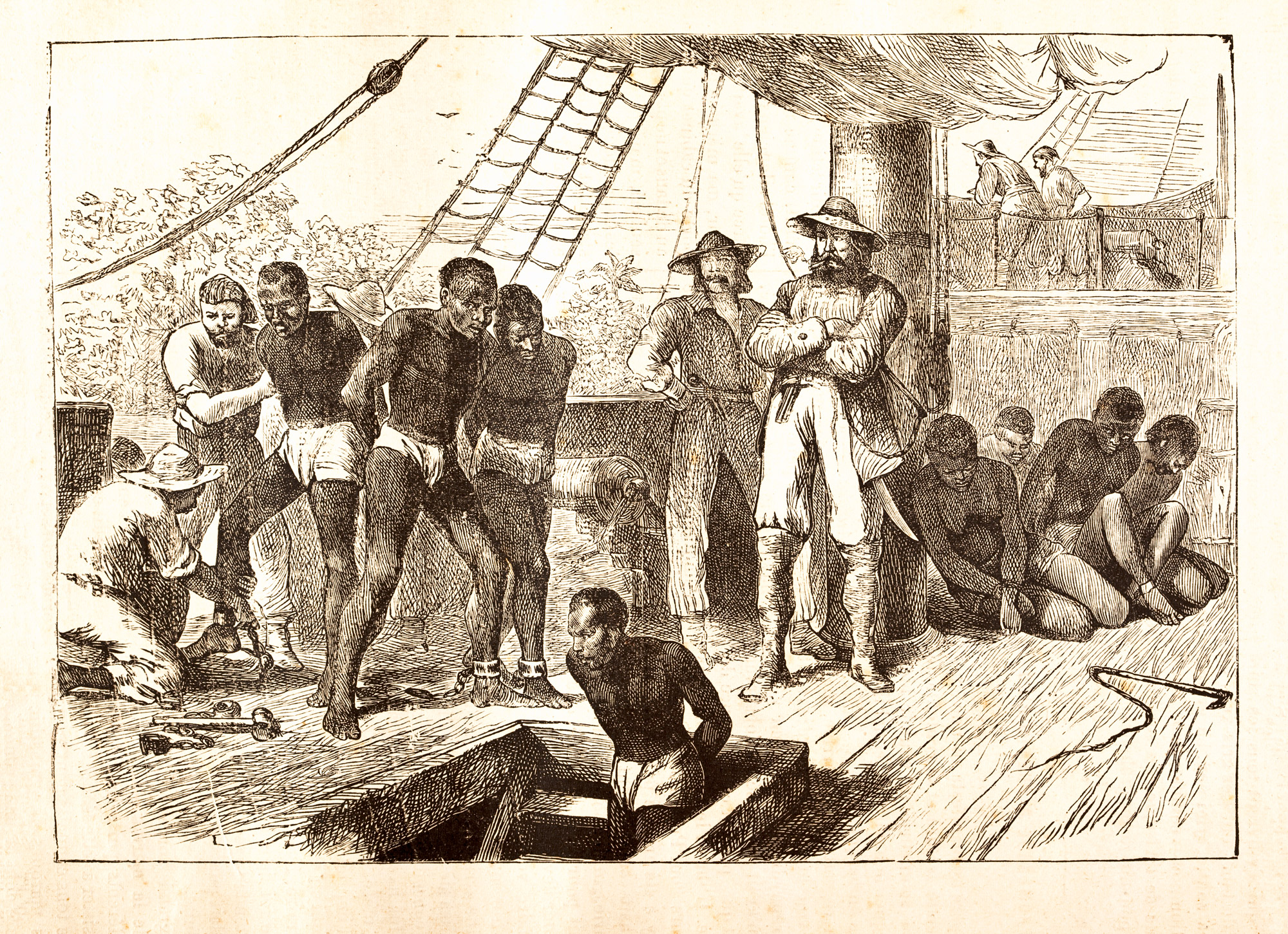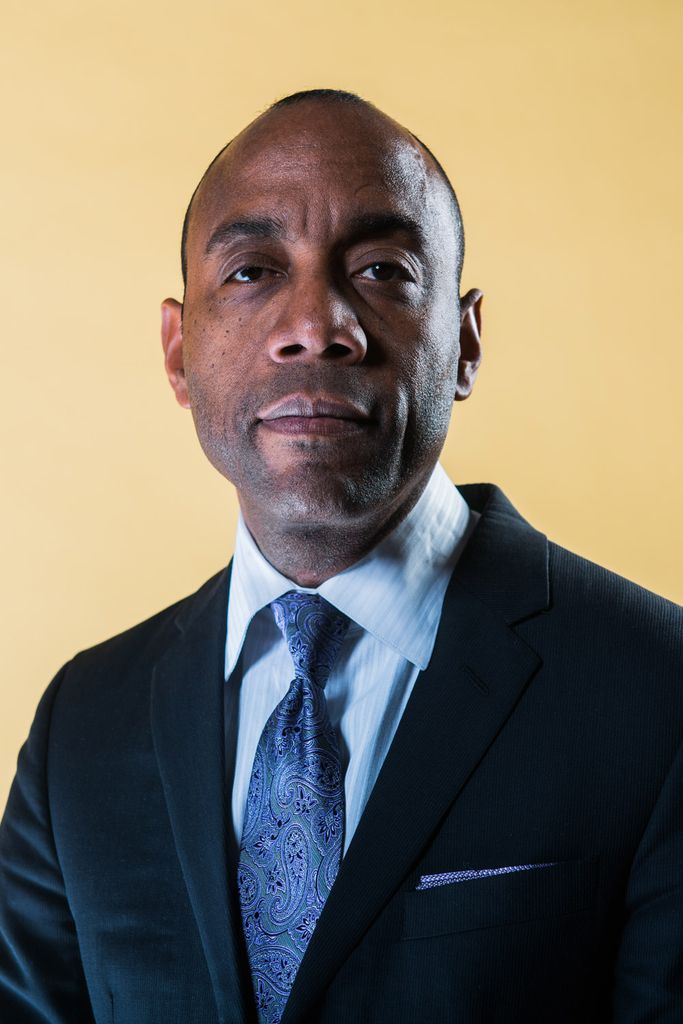SPH Addresses 400 Years of Inequality at Dean’s Symposium Today

This year marks the 400th anniversary of the arrival of the first slave ship to America. In 1619, a group of 20 Africans were sold into bondage in Jamestown, Va. The BU School of Public Health is joining other schools of public health around the country to observe 400 Years of Inequality with a Dean’s Symposium exploring ways to disrupt systemic racism. Photo by Grafissimo/iStock
SPH Addresses 400 Years of Inequality at Dean’s Symposium Today
Speakers will include Cornell William Brooks (STH’87, Hon.’15), former NAACP president
When former NAACP CEO and president Cornell William Brooks was taunted with fried chicken and threatened with shouts of the N-word during a 43-day march in 2015 to mark the 50th anniversary of Bloody Sunday, he was undeterred.
And when Brooks (STH’87, Hon.’15) was arrested two years later during a sit-in at the office of Jeff Sessions (R-Ala.), then a US senator, to protest his nomination as attorney general, Brooks continued to speak out against the Trump administration’s policies on voting rights, immigration, and criminal justice.
An attorney, an ordained minister, and currently a professor of the practice of public leadership and social justice at the Harvard University John F. Kennedy School of Government, Brooks says threats and arrests are part of the job of a civil rights leader, and that he is inspired by the nationwide protests that continue to occur in support of social justice issues.
“When we look at divisions in this country, historically and empirically speaking the largest demonstrations of civil disobedience, nonviolent direct action, marches, and protests have taken place in the last few years,” says Brooks. “The Women’s March, March for Our Lives, climate marches—these demonstrations, protests, and acts of civil disobedience are really markers and measures of the aspiration that people have in this country to come together.”

On Friday, October 18, Brooks will be a keynote speaker at the School of Public Health Dean’s Symposium 400 Years of Inequality: Breaking the Cycle of Systemic Racism, cohosted with the SPH Activist Lab, the Howard Thurman Center for Common Ground, and the Museum of African American History. The day is part of a national movement by schools of public health across the country to engage in the observance of 400 Years of Inequality, marking the arrival of the first slave ship to America, with a group of 20 Africans who were first sold into bondage in Jamestown, Va.
The symposium seeks to use the anniversary to explore ways to disrupt systemic racism, focusing on solution-driven discussions. The event, free and open to the public, begins at 8:30 am in the Hiebert Lounge, 72 East Concord St., on the Medical Campus.
“What the School of Public Health is doing—bringing scholars together to analyze the past and present and chart strategies for the course ahead—is incredibly important, morally ambitious, and perfectly timed,” Brooks says. “I’d like to believe that a nation of enslaved Americans, most of whom couldn’t read or write, would be pleased that so many young people find their experiences important enough to think about, write about, and use to guide this country to where it should be.”
Neera Tanden, president and CEO of the Center for American Progress, will also deliver a keynote address. Marita Rivero, executive director of the Museum of African American History, will provide a historical perspective, and the event will conclude with a performance and interactive dialogue with Rhodessa Jones, artist-in-residence at the SPH Activist Lab.
BU Today spoke with Brooks ahead of the symposium about racism in America, his longtime work in civil rights, and the next generation of leaders.
Q&A
with Cornell Brooks
BU Today: From racist rhetoric to hate crimes, what do you think is driving racism in this country and how do we successfully address it?
Brooks: Given the state of division in the country and this moment of the observation of the 400th anniversary of slavery, now is the perfect time to ask ourselves, “How did we get here, and how can we go beyond where we are to where we aspire to be as a country?”
We have to acknowledge that slavery didn’t end in 1863 with the Emancipation Proclamation, or in 1865 with the 13th Amendment—neo-slavery and the era of mass incarceration extended slavery beyond the 1800s and into some form that exists today. We also need to acknowledge that the tools that we used to vanquish slavery in the past are some of the tools that we need to use today, including law, policy, research, protest, art, advocacy, and morality.
As a professor and civil rights leader, one thing I always teach my students is that hope can’t be empirically demonstrated—it has to be morally chosen. There is much that one could be despairing and despondent about, but people are choosing to be hopeful.
After [the mass shootings at] the Tree of Life and Mother Emanuel, religious attendance didn’t decline. People become more engaged, more involved, and more committed. So this is a measure of the danger of our times, but also a measure of the courage of the people. Look at the number of young people leaving school to protect the health and well-being of the planet—they haven’t given up.
Throughout your career fighting for equality and justice, you’ve been arrested numerous times and received frequent threats of physical harm. What has that experience been like for you?
The work of democracy is life-changing work, but it is also life-risking work. In Ferguson, Mo., when we marched from the home of Michael Brown to the home of the governor, we had to alter our march route when the route was published in the newspaper, and according to law enforcement, we were going to be ambushed by the Klan. We were ambushed, with people confronting us on the streets in Rosebud, Mo., and displaying racial animus with malt liquor bottles, watermelon, boxes of fried chicken, and shouts of the N-word.
At the NAACP, we had to abandon our building because of a bomb threat. At one of our local branches in Houston, people showed up with AR-15s on the Christian Sabbath day. We received death threats online, in the mail, and in person on a regular basis. In the march from Selma to DC, we marched 1,000 miles in 43 days. When we arrived in South Carolina, then-Governor Nikki Haley said we couldn’t come through Greenville-Spartanburg because they couldn’t ensure our security. That meant the activists had to march an additional 200 miles.
Since I’ve left the NAACP, I still occasionally get threats. That’s a part of the work that one would like to avoid, but you can’t avoid it if you’re serious about doing the work. And that’s for anyone, not just people who are doing civil rights work. If you don’t see leaders pushing the envelope or incurring any risk, that may be the time to ask whether they’re demonstrating real leadership.
Recent hate crimes and online threats today are risks not only imposed upon professional activists, but on ordinary Americans. Trans Americans are being assaulted and killed, synagogues and churches are being shot up, and mosques are being threatened. This is a real and serious moment in the country, where physical dangers to American citizens are emblematic of the dangers to our democracy.
Do you think the social justice activism among millennials today is the key to achieving equality in the future?
In the darkest of times, the fact that you have people organizing, convening, demonstrating, protesting, and bearing witness to the light among them says everything about their capacity to bring about change. These demonstrations, protests, and acts of civil disobedience are not only expressions of outrage, they’re expressions of aspiration. They’re contemporary, up-to-date, Twitter-moment-ready vehicles for bringing about the realization of democracy.
You have a generation of Twitter citizens who are more knowledgeable and thoughtful about Reconstruction than students were a generation ago. You have young people talking about the Abolitionist movement, both in terms of the abolishment of slavery and the deconstruction of a carceral state and the ending of mass incarceration. We not only have a country that is becoming increasingly historically literate with respect to slavery, but also using the lessons of slavery to inform and inspire the direction of the country. That’s incredibly powerful. I never heard slavery discussed with the depth, and intellectual and moral richness, that I hear young people talking about it today.
The work of this new generation of activists, public servants, and leaders deserves to be honored in the same way that we honored Dr. King by the memorial on Marsh Plaza. The history that we read about in high school is happening right now; it’s just not in your textbook, it’s on your Twitter feed. We forget that the elder statesman Rep. John Lewis (D-Ga.) (Hon.’18) was also the junior and senior in high school who wrote letter after letter to Dr. King before he got a meeting, and he was also the young upstart whose words everyone was afraid of at the March on Washington. There’s a new generation of John Lewises and Martin Luther Kings and Rosa Parkses and Claudette Colvins today.
Event Details
400 Years of Inequality: Breaking the Cycle of Systemic Racism
Marking 400 years since a group of 20 Africans were first sold in bondage in Jamestown, Virginia, this Dean’s Symposium aims to use this anniversary to discuss how we can disrupt systemic racism, with forward-looking and solution-driven discussions. Breakfast begins at 8 am. The event is free and open to the public.
Comments & Discussion
Boston University moderates comments to facilitate an informed, substantive, civil conversation. Abusive, profane, self-promotional, misleading, incoherent or off-topic comments will be rejected. Moderators are staffed during regular business hours (EST) and can only accept comments written in English. Statistics or facts must include a citation or a link to the citation.